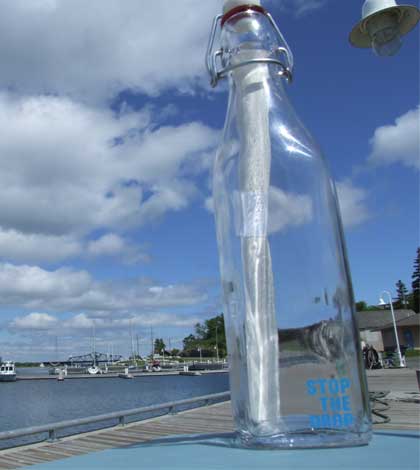To the Expositor:
Mr. Coulter’s letter of November 13 (‘Lake Manitou Association explains science’) inaccurately presumes to speak for the group’s 230 members, makes invalid assumptions, and advances implausible arguments.
The association’s executive is divided on the issue of whether to freeze development on the lake at the expense of local residents. It has not consulted the group’s 230 members, many of whom don’t support such a freeze.
Mr. Coulter says that phosphates from dwellings along the shore have somewhat reduced deep-water oxygen levels and also says there is no “evil industry or exceptional other cause to blame.” That overlooks 150 years of agricultural runoff including some from distant sinkholes.
It is true that in the past outhouses, raw sewage and deplorable cottage septic systems released phosphates into the large, pristine lake. Some still do. Mr. Coulter, however, makes an unwarranted assumption that modest new development with mandatory modern septic systems would do significant harm.
He cites some recent measurement of oxygen levels in deep water but can provide no baseline data to go by, and no sense of trends. He glosses over measurements that are only very slightly below normal (on his own scale) in one major basin, and emphasizes findings well below normal in another. Nevertheless he himself admits that the lake-trout population is still viable.
Mr. Coulter repeatedly calls that population at risk, but indicates no degree of risk. Is it a minor risk, such as we accept with normal driving, or is it more like the odds with drunk driving on drugs? All risk seems to be the same to Mr. Coulter.
Since he is arguing for change, the burden of scientific proof falls on him to prove that current septic regulations are inadequate to protect the environment. He doesn’t.
Nor does he address recent references to a government report some years ago that concluded the lake could sustain some 5,000 dwellings without undue pressure on the environment. That is many times the current number.
Mr. Coulter cites the opinion of ministry officials that the lake is “at capacity,” although he doesn’t disclose criteria for saying so. He also supports embedding that designation in the Official Plan to prohibit new development along the shore.
Most curiously, he argues that unless that is done, the MNR may discontinue monitoring the lake. In other words, he wants us to believe the MNR would allocate scarce resources to studying a lake that it had locked up against development.
Mr. Coulter also argues disingenuously that the “at capacity” designation can readily be taken out of the Official Plan in five years “as an administrative matter” if the MNR officials change their minds. Also unbelievable.
Mr. Coulter wants the Manitoulin Planning Board to invite the government officials to make their case at one of the board’s regular evening meetings. That is no way to test dubious claims. They would undoubtedly be as one-sided as Mr. Coulter, who argues more like a polemicist rather than like a scientist—though taking care to add initials to his signature: M.Sc.—Master of Science.
It would be good if all of the Island municipalities stood firmly at the planning board for a balanced policy of reasonable environmental protection and reasonable development, rather than a mindless freeze pushed by officials and cottagers with a single-minded agenda.
The municipalities could also help the planning board escalate its call for the government to require that old septic systems comply with current rules, much the way that I understand homeowners must replace tanks for home-heating oil that are more than 15 years-old. The cottage association should agree with that.
Perry Anglin Lake Manitou(As to my perspective: my wife and I own a year-round house on Lake Manitou, and are among the association members whom Mr. Coulter inaccurately claims to represent. A development freeze would increase the value of our home, at the expense, sadly, of residents who don’t live on the lake, or can’t. Also, like Mr. Coulter I have a Master of Science degree. In my case, I coordinated more than $10 million dollars of environmental research and set up a public inquiry that froze a major resource project on socio-economic and environmental grounds. My education was not in a particular scientific discipline, but taught me to discern, among other things, bias and sophistry.)





